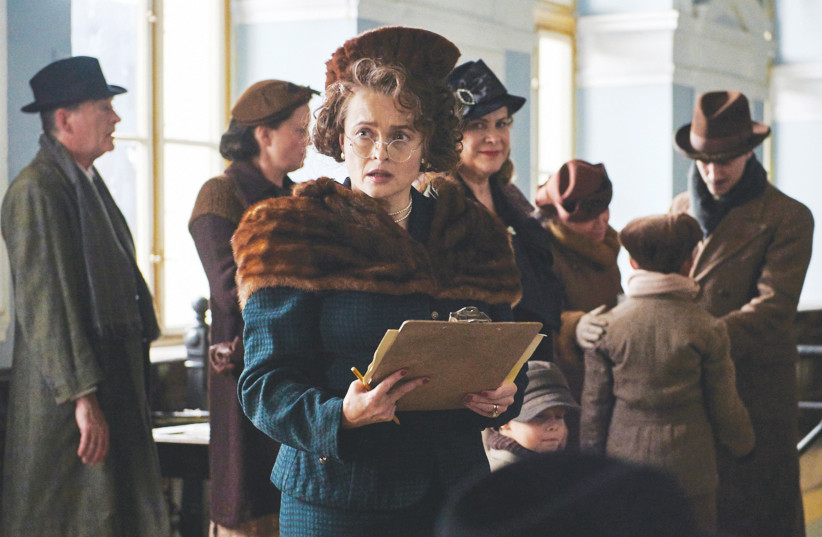Anthony Hopkins gives a fine performance in James Hawes’s One Life, which opens throughout Israel on March 28, in which he plays Nicky Winton, a man whose name may not be widely known today but who was dubbed “the British Schindler.”
The movie is a conventional retelling of Winton’s wartime heroism and its emotional toll on him decades later, told in two time frames. His is an extraordinary story, with a strong payoff and stellar performances by two-time Oscar winner Hopkins and a star-studded supporting cast.
Winton is the classic unassuming person who acted with great courage and resourcefulness when an opportunity presented itself, and in this way, represents the kind of person we all hope we will turn out to be. Born in the UK to German-Jewish immigrants early in the 20th century, he was baptized and raised as a Christian, a not uncommon background in those days. Played as a young man by Johnny Flynn, a rising British star who portrayed Ian Fleming in Operation Mincemeat, Winton grew up to be a not very wealthy stockbroker and identified with a sort of armchair socialism.
He learned of the plight of children in Czechoslovakia, mainly Jewish ones, in 1938. They had fled to Prague as Germany prepared to occupy the Sudetanland region, the result of the now-infamous deal that British prime minister Neville Chamberlain announced would bring “peace for our time.”
Winton and his circle of friends were skeptical of this claim, as were thousands across Europe, but unlike most, he acted on his suspicions. While his friends focused on helping rescue activists who would be the first to be arrested when the Nazis eventually seized control of all of Czechoslovakia, Winton became increasingly concerned for the plight of the hundreds of children who were displaced and freezing in shacks and on the streets of Prague in the winter.

Discouraged by his flighty mother (Helena Bonham Carter, who is always good but who gives an especially endearing performance here), he nevertheless put his job at risk as he worked tirelessly to find a way to save these children, refusing to accept that the many bureaucratic and political obstacles made this seem like an impossible task.
AS HE TRAVELED back and forth to Prague, his mother quipped, “Everyone in Prague is trying to get out; my son is trying to get in.” First, he had to identify the children who needed to be evacuated, creating photo IDs for them, which involved him winning the confidence of Jewish authorities – a tough task considering his assimilated background.
He also had to find a way to get the hundreds of children out by train through the Netherlands, which had closed its borders, and also get the UK to accept them. The Kindertransport program brought children mainly from Germany and Austria, not from Czechoslovakia, so he had to create his own Kindertransport program from scratch, finding families who would agree to adopt the children and raising contributions to prove that they would not become a burden on the state.
As the movie shows, none of this effort came naturally to the retiring Winton, which is what makes him interesting as well as admirable. His passion for his mission, once he identified his goal, inspired many to become involved – including his charming mother, who worked alongside him and took a key role in persuading reluctant, uninterested bureaucrats to cooperate.
Later in life, though, when he had drifted into a quiet existence as a married broker in a British suburb, his accomplishment was not as much of a comfort to him as you might think. Hopkins shines in these later sections, when he struggles with guilt over his failures, feeling he could have done more. At the same time, he does crave recognition. Prompted by his wife (Lena Olin) to clean out all his papers, he searches out former comrades who helped him save children, among them one played by Jonathan Pryce (Game of Thrones, Brazil) and he tries to get a journalist interested in writing an article about him, but the editor tells him there is no “local angle.”
The film moves toward a satisfying and moving conclusion that made me cry and elicited tears from many sitting near me. Britons may be able to make a guess at it, but I think – based on those I heard talking about the movie afterwards – that even if you know what’s coming, it’s still a wonderful scene.
One Life is a worthwhile movie, one that may lift your mood now, just a few weeks before Israel’s Holocaust Remembrance Day, on the anniversary of the Warsaw Ghetto uprising. While so much was lost, it’s worth celebrating those few brave souls who did the right thing, at a time when no one understood why they cared.
